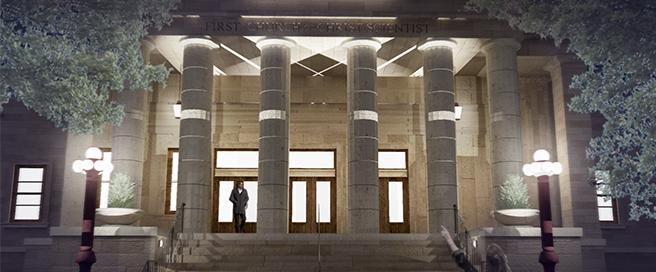Nichols Concert Hall Renovations Planned

October 12th, 2017
October 6, 2017
The Music Institute of Chicago is preparing to undertake significant capital restoration of Nichols Concert Hall, a cultural anchor on Chicago’s North Shore located at 1490 Chicago Avenue in Evanston. The project will enhance and improve the experience for audiences of chamber music, jazz, orchestral concerts, dance, and much more, while preserving the characteristics that qualified the facility for landmark designation by the Evanston Historical Landmark Commission.
Support Nichols Concert Hall today! Your gift at any level is instrumental to the care and maintenance of this landmark concert hall.
Renovation work began in 2015 and included a full replacement of the HVAC system, repairs to 12 original entrance doors, and restoration of window lintels. In this second phase of capital improvements, the Music Institute will rebuild the Hall’s front steps with a full masonry restoration of the Indiana Limestone Treads matching original materials and aesthetics, replace hand railings, add lighting, and refresh landscaping. Immediate repair of the entry is imperative due to safety concerns, and the aging decline and settlement of the staircase led to deterioration of the original foundation. This exterior renovation has been approved by the Evanston Historical Landmark Commission and the work is scheduled for completion in late April 2018.
The Music Institute of Chicago is deeply grateful to Alexandra C. and John D. Nichols for their generous support, which will enable the masonry restoration of the Hall's beautiful façade, and Landmarks Illinois. In addition, the Music Institute Board of Trustees underwrote the restoration of the Hall’s interior lobby parquet flooring to correct and re-lay a section that has warped due to environmental influences.
JAQ Corp Intl, P.C. has been awarded the contract for the masonry and lighting restoration project. The Architect of Record is John M. Gay, NCARB, AIA.
Nichols Concert Hall, a Classical Revival-style structure, was designed in 1912 by renowned Chicago architect Solon S. Beman as First Church of Christ, Scientist. The Music Institute acquired the building and transformed the upper level into an acoustically perfect, 550-seat performance space that is home to a fully restored 1914 E.M. Skinner pipe organ. The Music Institute converted the lower level into Evanston’s Community Music School campus. Nichols Concert Hall opened in 2003 and received the Richard H. Driehaus Award for best adaptive use by the Landmarks Preservation Council of Illinois.
Each year, the Music Institute presents a Faculty and Guest Artist Series featuring performances by world-renowned artists-in-residence, faculty, and students. Serving more than 15,000 people of all ages from Chicago, Evanston, and the surrounding suburbs, Nichols Concert Hall features more than 600 events annually, including classical music and dance performances, jazz ensembles, chamber music concerts, world-class lectures, free music education programs, and instrument “petting zoos” for families. Nichols Concert Hall also serves as a popular rental space for local organizations, including the Chicago Philharmonic, Dance Chicago, WFMT, and the Chicago Children’s Choir. Professional musicians book Nichols Concert Hall for audio and visual recordings, and students from the Music Institute’s ArtsLink program, Community Music School, and Academy for gifted pre-college musicians regularly have the opportunity to perform in this state-of-the-art venue.
As the home to the Evanston campus of the Music Institute’s Community Music School, Nichols Concert Hall’s lower level houses comprehensive instruction in all classical instruments and voice. The Music Institute maintains a diverse, 189-member teaching faculty that supports nearly 2,000 students of all ages each year across eight campus locations. The faculty provides private and group instruction in classical and jazz styles, as well as a wide array of ensemble experiences, including adult studies, orchestras, bands, chamber music, jazz, musical theater, early childhood music, composition, conducting, and musicianship.
